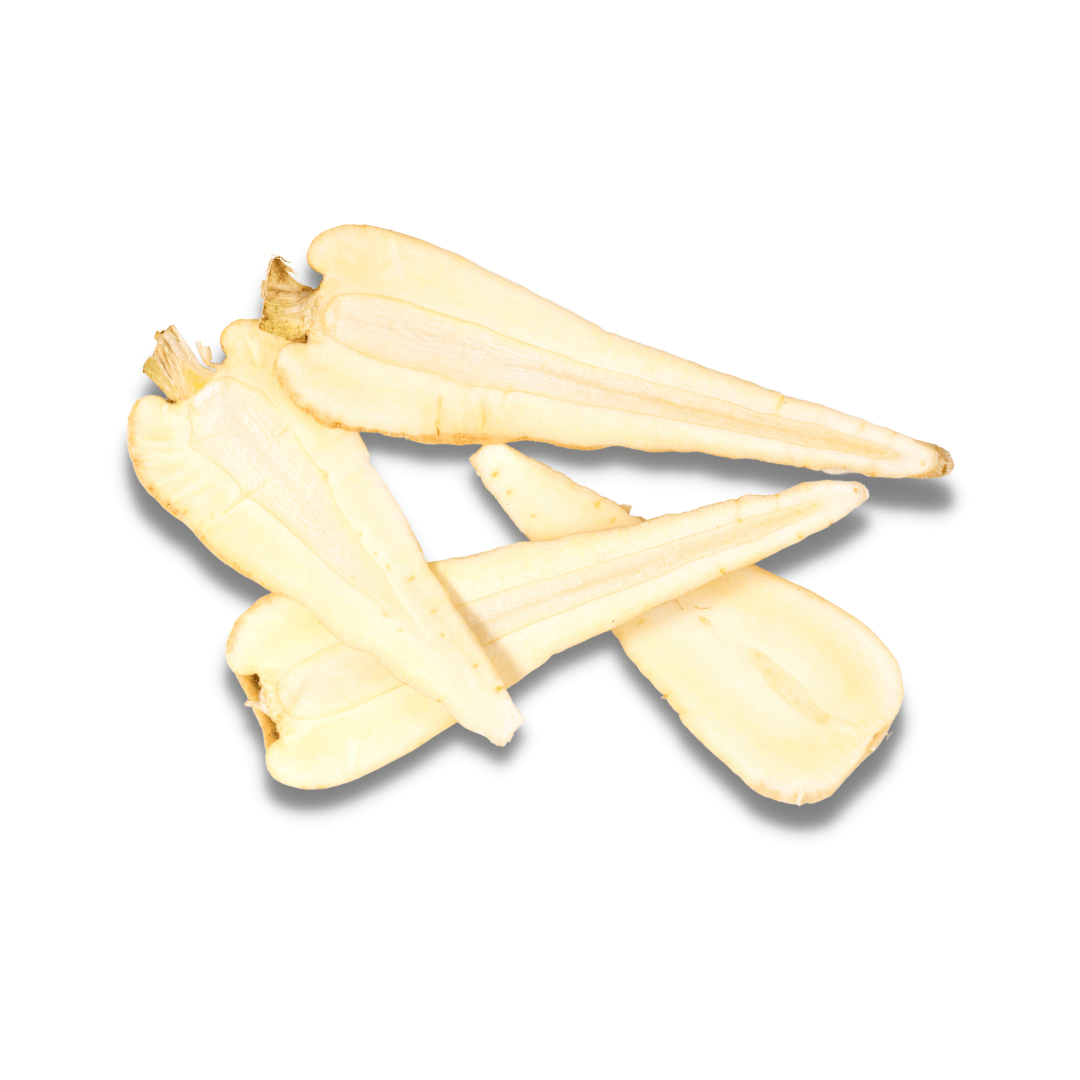ABOUT
Parsnip is a root vegetable that belongs to the same family as carrots, celery, and parsley. It is similar in appearance to carrots, but it is paler in color and has a sweet, nutty flavor.
Health Benefits of Parsnip:
-
Rich in fiber: Parsnips are a good source of dietary fiber, which helps in maintaining digestive health and promoting regular bowel movements.
-
Good for vision: Parsnips are rich in vitamin A, which is essential for maintaining good eyesight.
-
Boosts immunity: Parsnips are rich in vitamin C, which helps in boosting the immune system and prevent infections.
-
Regulates blood pressure: Parsnips are low in sodium and high in potassium, which helps in regulating blood pressure.
-
Anti-inflammatory properties: Parsnips contain antioxidants and anti-inflammatory compounds, which help in reducing inflammation in the body.
-
May prevent cancer: Parsnips contain phytochemicals that have been linked to a lower risk of certain types of cancer.
List of diseases that can be cured:
While parsnips cannot cure diseases, they can be part of a healthy diet that may help prevent certain diseases. Eating a diet rich in vegetables like parsnips has been linked to a lower risk of chronic diseases such as heart disease, diabetes, and some types of cancer.
Macro Nutrient Content of Parsnips (per serving of 50g):
| Nutrient | Amount |
|---|---|
| Carbohydrates | 7.8g |
| Protein | 0.9g |
| Fat | 0.2g |
| Fiber | 2.1g |
| Water | 38.4g |
Vitamin Content of Parsnips (per serving of 50g):
| Vitamin | Amount |
|---|---|
| Vitamin A | 383 IU |
| Vitamin B1 | 0.1mg |
| Vitamin B2 | 0.04mg |
| Vitamin B3 | 0.6mg |
| Vitamin B6 | 0.08mg |
| Vitamin B12 | 0.0mcg |
| Vitamin C | 8.1mg |
| Vitamin D | 0.0 IU |
| Vitamin E | 0.3mg |
| Vitamin K | 8.5mcg |
| Folate | 20.5mcg |
| Biotin | 0.2mcg |
Mineral Content of Parsnips (per serving of 50g):
| Mineral | Amount |
|---|---|
| Calcium | 22mg |
| Iron | 0.3mg |
| Iodine | 0.0mcg |
| Zinc | 0.3mg |
| Magnesium | 12mg |
| Phosphorus | 33mg |
| Potassium | 232mg |
| Sodium | 3mg |
| Chloride | 16mg |
| Copper | 0.04mg |
| Chromium | 0.0mcg |
| Fluoride | 4mcg |
| Molybdenum | 2mcg |
| Manganese | 0.2mg |
| Selenium | 0.4mcg |
What are the health benefits of parsnip?
Parsnip offers health benefits such as providing dietary fiber, vitamin C, and potassium, supporting digestive health, boosting the immune system, and promoting heart health.
How to cook parsnip?
Parsnips can be cooked by roasting, boiling, or steaming. It can be used in soups, stews, purees, or roasted as a side dish.
Is parsnip good for weight loss?
Parsnip is a low-calorie vegetable that is high in fiber, making it a suitable choice for weight loss diets as it helps promote satiety.
Are there any side effects of consuming parsnip?
While parsnips are generally safe to consume, some individuals may experience allergic reactions. It is important to be cautious if you have known allergies or sensitivities.
Can parsnip boost the immune system?
Parsnip contains vitamin C and other antioxidants that can help support the immune system and protect against oxidative stress.
How does parsnip support heart health?
Parsnip is a good source of potassium, which can help regulate blood pressure and support heart health.
What nutrients are present in parsnip?
Parsnip is rich in dietary fiber, vitamin C, vitamin K, folate, and potassium, among other essential nutrients.
How to incorporate parsnip into your diet?
Parsnip can be used in various ways, such as in soups, stews, roasted dishes, mashed or pureed, or as a flavorful addition to casseroles and gratins.
Does parsnip have antioxidant properties?
Yes, parsnip contains antioxidants that help protect cells from damage caused by free radicals.
Can parsnip help lower cholesterol levels?
Parsnip is a good source of dietary fiber, which can help lower cholesterol levels and promote heart health.
What are the different cooking methods for parsnip?
Parsnip can be roasted, boiled, steamed, or used in various dishes such as soups, stews, and gratins.
Can parsnip be consumed raw?
While parsnip is often cooked, it can be consumed raw in salads or grated for a crunchy texture.
Are there any parsnip-based soups or stews?
Yes, parsnip can be used as a key ingredient in soups or stews, adding a sweet and earthy flavor.
Does parsnip aid in digestion?
Yes, parsnip is a good source of dietary fiber, which promotes healthy digestion and helps maintain regular bowel movements.
Can parsnip help in managing diabetes?
Parsnip has a moderate glycemic index and can be included in a balanced diet for individuals with diabetes. However, portion control and overall dietary considerations are important.
Can parsnip be used in vegetarian or vegan dishes?
Absolutely! Parsnip can be used in various vegetarian or vegan recipes, providing a delicious and nutritious option.
How to store parsnip to keep it fresh?
Remove the greens, store parsnips in a cool and dark place, and avoid washing them until ready to use. They can last for a few weeks when stored properly.
Can parsnip be roasted or grilled?
Yes, parsnips can be roasted or grilled to bring out their natural sweetness and create a caramelized flavor.









